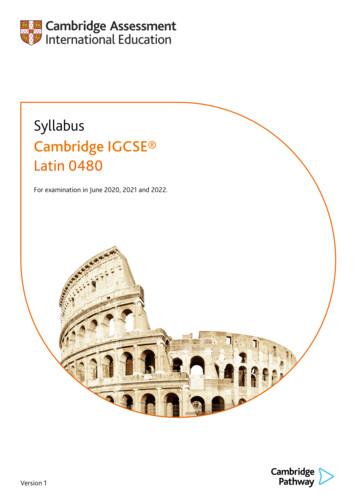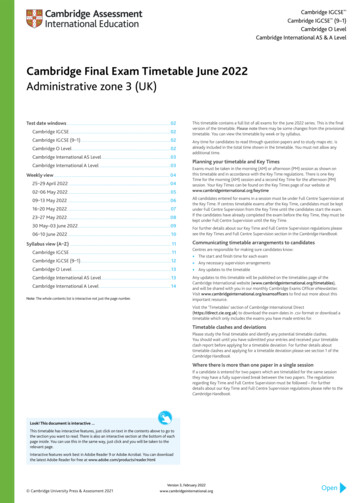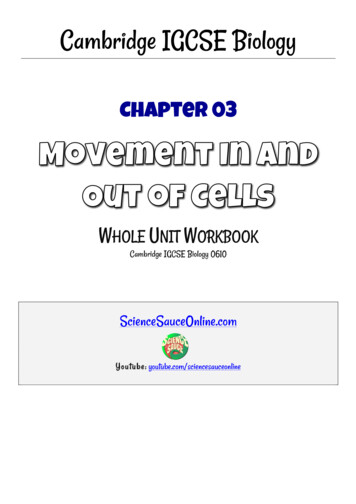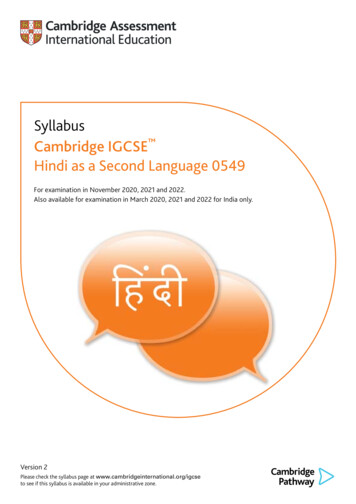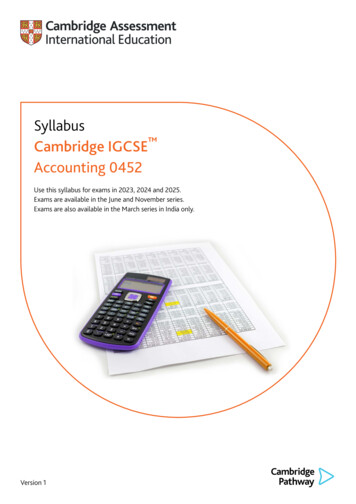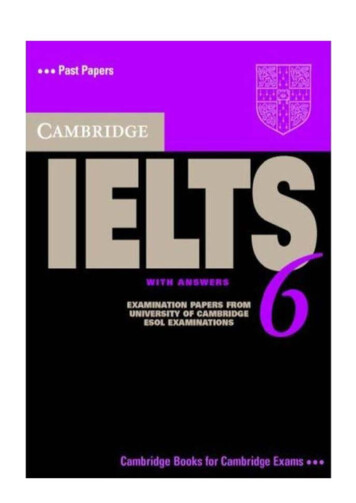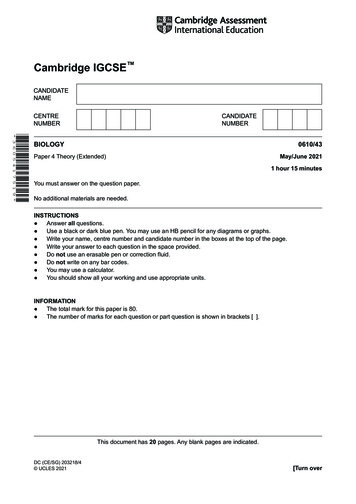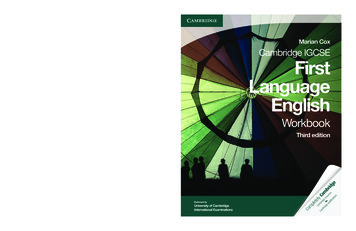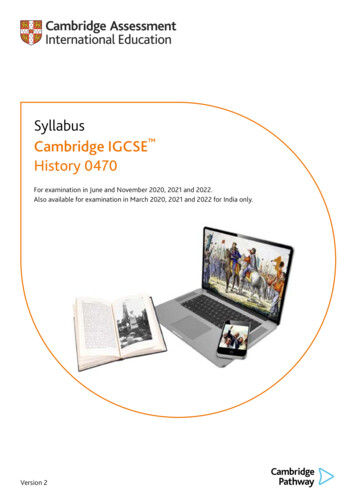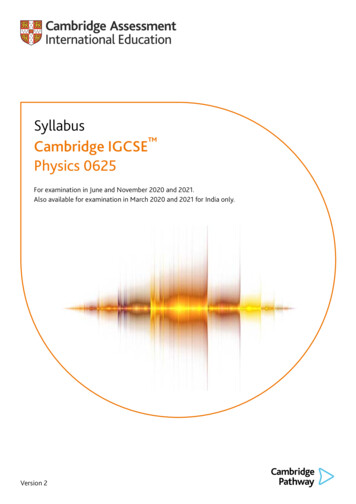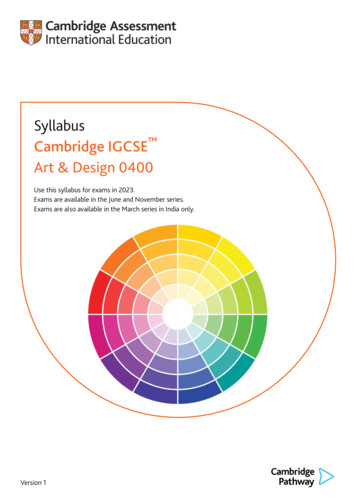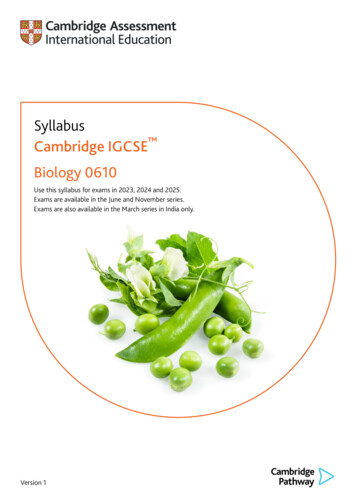
Transcription
SyllabusCambridge IGCSE Biology 0610Use this syllabus for exams in 2023, 2024 and 2025.Exams are available in the June and November series.Exams are also available in the March series in India only.Version 1
Why choose Cambridge International?Cambridge International prepares school students for life, helping them develop an informed curiosity and a lastingpassion for learning. We are part of the University of Cambridge.Our Cambridge Pathway gives students a clear path for educational success from age 5 to 19. Schools can shapethe curriculum around how they want students to learn – with a wide range of subjects and flexible ways to offerthem. It helps students discover new abilities and a wider world, and gives them the skills they need for life, so theycan achieve at school, university and work.Our programmes and qualifications set the global standard for international education. They are created by subjectexperts, rooted in academic rigour and reflect the latest educational research. They provide a strong platform forlearners to progress from one stage to the next, and are well supported by teaching and learning resources.Our mission is to provide educational benefit through provision of international programmes and qualifications forschool education and to be the world leader in this field. Together with schools, we develop Cambridge learnerswho are confident, responsible, reflective, innovative and engaged – equipped for success in the modern world.Every year, nearly a million Cambridge students from 10 000 schools in 160 countries prepare for their future withthe Cambridge Pathway.‘We think the Cambridge curriculum is superb preparation for university.’Christoph Guttentag, Dean of Undergraduate Admissions, Duke University, USAQuality managementCambridge International is committed to providing exceptional quality. In line with this commitment, ourquality management system for the provision of international qualifications and education programmesfor students aged 5 to 19 is independently certified as meeting the internationally recognised standard,ISO 9001:2015. Learn more at www.cambridgeinternational.org/ISO9001Copyright UCLES September 2020Cambridge Assessment International Education is part of the Cambridge Assessment Group. Cambridge Assessment is the brand name ofthe University of Cambridge Local Examinations Syndicate (UCLES), which itself is a department of the University of Cambridge.UCLES retains the copyright on all its publications. Registered centres are permitted to copy material from this booklet for their owninternal use. However, we cannot give permission to centres to photocopy any material that is acknowledged to a third party even forinternal use within a centre.
Contents1 Why choose this syllabus? . 22 Syllabus overview . 5Aims5Content overview6Assessment overview7Assessment objectives83 Subject content .104 Details of the assessment . 45Core assessment45Extended assessment45Practical assessment46Apparatus, materials and reagents48Safety in the laboratory50Mathematical requirements50Presentation of data51Conventions (e.g. signs, symbols, terminology and nomenclature)53Command words545 What else you need to know .55Before you start55Making entries56After the exam57How students and teachers can use the grades57Grade descriptions57Changes to this syllabus for 2023, 2024 and 202558Important: Changes to this syllabusFor information about changes to this syllabus for 2023, 2024 and 2025, go to page 58
Cambridge IGCSE Biology 0610 syllabus for 2023, 2024 and 2025.1 Why choose this syllabus?Key benefitsCambridge IGCSE is the world’s most popular internationalqualification for 14 to 16 year olds, although it can be taken bystudents of other ages. It is tried, tested and trusted.Students can choose from 70 subjects in any combination – it istaught by over 4800 schools in over 150 countries.Our programmes balance a thorough knowledge and understandingof a subject and help to develop the skills learners need for theirnext steps in education or employment.CambridgelearnerCambridge IGCSE Biology develops a set of transferable skillsincluding handling data, practical problem-solving and applyingthe scientific method. Learners develop relevant attitudes, such asconcern for accuracy and precision, objectivity, integrity, enquiry, initiative and inventiveness. They acquire theessential scientific skills required for progression to further studies or employment.Our approach in Cambridge IGCSE Biology encourages learners to be:confident, interested in learning about science, questioning ideas and using scientific language to communicatetheir views and opinionsresponsible, working methodically and safely when working alone or collaboratively with othersreflective, learning from their experiences and interested in scientific issues that affect the individual, thecommunity and the environmentinnovative, solving unfamiliar problems confidently and creativelyengaged, keen to develop scientific skills, being curious about scientific principles and their application in the world.‘The strength of Cambridge IGCSE qualifications is internationally recognised and has providedan international pathway for our students to continue their studies around the world.’Gary Tan, Head of Schools and CEO, Raffles International Group of Schools, Indonesia2www.cambridgeinternational.org/igcseBack to contents page
Cambridge IGCSE Biology 0610 syllabus for 2023, 2024 and 2025. Why choose this syllabus?International recognition and acceptanceOur expertise in curriculum, teaching and learning, and assessment is the basis for the recognition of ourprogrammes and qualifications around the world. The combination of knowledge and skills in Cambridge IGCSEBiology gives learners a solid foundation for further study. Candidates who achieve grades A* to C are well preparedto follow a wide range of courses including Cambridge International AS & A Level Biology or Marine Science.Cambridge IGCSEs are accepted and valued by leading universities and employers around the world as evidence ofacademic achievement. Many universities require a combination of Cambridge International AS & A Levels andCambridge IGCSEs or equivalent to meet their entry requirements.UK NARIC, the national agency in the UK for the recognition and comparison of international qualifications andskills, has carried out an independent benchmarking study of Cambridge IGCSE and found it to be comparable tothe standard of the reformed GCSE in the UK. This means students can be confident that their Cambridge IGCSEqualifications are accepted as equivalent to UK GCSEs by leading universities worldwide.Learn more at idge IGCSE is one of the most sought-after and recognised qualifications in the world. Itis very popular in Egypt because it provides the perfect preparation for success at advanced levelprogrammes.’Managing Director of British School in Egypt BSEBack to contents pagewww.cambridgeinternational.org/igcse3
Cambridge IGCSE Biology 0610 syllabus for 2023, 2024 and 2025. Why choose this syllabus?Supporting teachersWe provide a wide range of resources, detailed guidance and innovative training and professional development sothat you can give your students the best possible preparation for Cambridge IGCSE. To find out which resources areavailable for each syllabus go to our School Support Hub.The School Support Hub is our secure online site for Cambridge teachers where you can find the resources you needto deliver our programmes. You can also keep up to date with your subject and the global Cambridge communitythrough our online discussion forums.Find out more at www.cambridgeinternational.org/supportPlanning and preparationTeaching and assessment Next step guides Endorsed resources Schemes of work Online forums Specimen papers Support for coursework and speaking tests Syllabuses Teacher guidesLearning and revisionSupportfor CambridgeIGCSE Example candidate responsesResults Candidate Results Service Learner guides Principal examiner reports for teachers Past papers and mark schemes Results Analysis Specimen paper answersSign up for email notifications about changes to syllabuses, including new and revised products and services ofessional developmentWe support teachers through: Introductory Training – face-to-face or online Extension Training – face-to-face or online Enrichment Professional Development – face-to-face or onlineFind out more at www.cambridgeinternational.org/events Cambridge Professional Development QualificationsFind out more at www.cambridgeinternational.org/profdevSupporting exams officersWe provide comprehensive support and guidance for all Cambridge exams officers. Find out more ridgeinternational.org/igcseBack to contents page
Cambridge IGCSE Biology 0610 syllabus for 2023, 2024 and 2025.2 Syllabus overviewAimsThe aims describe the purposes of a course based on this syllabus.You can deliver some of the aims using suitable local, international or historical examples and applications, orthrough collaborative practical work.The aims are to enable students to: acquire scientific knowledge and understanding of scientific theories and practice develop a range of experimental skills, including handling variables and working safely use scientific data and evidence to solve problems and discuss the limitations of scientific methods communicate effectively and clearly, using scientific terminology, notation and conventions understand that the application of scientific knowledge can benefit people and the environment enjoy science and develop an informed interest in scientific matters which support further study.Cambridge Assessment International Education is an education organisation and politically neutral.The contents of this syllabus, examination papers and associated materials do not endorse any politicalview. We endeavour to treat all aspects of the exam process neutrally.Back to contents pagewww.cambridgeinternational.org/igcse5
Cambridge IGCSE Biology 0610 syllabus for 2023, 2024 and 2025. Syllabus overviewContent overviewCandidates study the following topics:1Characteristics and classification of living organisms2Organisation of the organism3Movement into and out of cells4Biological molecules5Enzymes6Plant nutrition7Human nutrition8Transport in plants9Transport in animals10 Diseases and immunity11 Gas exchange in humans12 Respiration13 Excretion in humans14 Coordination and response15 Drugs16 Reproduction17 Inheritance18 Variation and selection19 Organisms and their environment20 Human influences on ecosystems21 Biotechnology and genetic ack to contents page
Cambridge IGCSE Biology 0610 syllabus for 2023, 2024 and 2025. Syllabus overviewAssessment overviewAll candidates take three papers.Candidates who have studied the Core syllabus content, or who are expected to achieve a grade D or below, shouldbe entered for Paper 1, Paper 3 and either Paper 5 or Paper 6. These candidates will be eligible for grades C to G.Candidates who have studied the Extended syllabus content (Core and Supplement), and who are expected toachieve a grade C or above, should be entered for Paper 2, Paper 4 and either Paper 5 or Paper 6. These candidateswill be eligible for grades A* to G.Core assessmentCore candidates take Paper 1 and Paper 3. The questions are based on the Core subject content only:Paper 1: Multiple Choice (Core)Paper 3: Theory (Core)45 minutes1 hour 15 minutes40 marks80 marks30%50%40 four-option multiple-choice questionsShort-answer and structured questionsExternally assessedExternally assessedExtended assessmentExtended candidates take Paper 2 and Paper 4. The questions are based on the Core and Supplement subjectcontent:Paper 2: Multiple Choice (Extended)Paper 4: Theory (Extended)45 minutes1 hour 15 minutes40 marks80 marks30%50%40 four-option multiple-choice questionsShort-answer and structured questionsExternally assessedExternally assessedPractical assessmentAll candidates take one practical paper from a choice of two:Paper 5: Practical TestPaper 6: Alternative to Practical1 hour 15 minutes1 hour40 marks40 marks20%Questions will be based on the experimentalskills in Section 4ORExternally assessed20%Questions will be based on the experimentalskills in Section 4Externally assessedInformation on availability is in the Before you start section.Back to contents pagewww.cambridgeinternational.org/igcse7
Cambridge IGCSE Biology 0610 syllabus for 2023, 2024 and 2025. Syllabus overviewAssessment objectivesThe assessment objectives (AOs) are:AO1 Knowledge with understandingCandidates should be able to demonstrate knowledge and understanding of: scientific phenomena, facts, laws, definitions, concepts and theories scientific vocabulary, terminology and conventions (including symbols, quantities and units) scientific instruments and apparatus, including techniques of operation and aspects of safety scientific and technological applications with their social, economic and environmental implications.Subject content defines the factual material that candidates may be required to recall and explain.Candidates will also be asked questions which require them to apply this material to unfamiliar contexts and toapply knowledge from one area of the syllabus to another.AO2 Handling information and problem-solvingCandidates should be able, in words or using other written forms of presentation (i.e. symbolic, graphical andnumerical), to: locate, select, organise and present information from a variety of sources translate information from one form to another manipulate numerical and other data use information to identify patterns, report trends and form conclusions present reasoned explanations for phenomena, patterns and relationships make predictions based on relationships and patterns solve problems, including some of a quantitative nature.Questions testing these skills may be based on information that is unfamiliar to candidates, requiring them to applythe principles and concepts from the syllabus to a new situation, in a logical, deductive way.AO3 Experimental skills and investigationsCandidates should be able to:8 demonstrate knowledge of how to select and safely use techniques, apparatus and materials (includingfollowing a sequence of instructions where appropriate) plan experiments and investigations make and record observations, measurements and estimates interpret and evaluate experimental observations and data evaluate methods and suggest possible ack to contents page
Cambridge IGCSE Biology 0610 syllabus for 2023, 2024 and 2025. Syllabus overviewWeighting for assessment objectivesThe approximate weightings allocated to each of the assessment objectives (AOs) are summarised below.Assessment objectives as a percentage of the qualificationAssessment objectiveWeighting in IGCSE %AO1 Knowledge with understanding50AO2 Handling information and problem-solving30AO3 Experimental skills and investigations20Total100Assessment objectives as a percentage of each componentAssessment objectiveWeighting in components %Papers 1 and 2Papers 3 and 4Papers 5 and 6AO1 Knowledge with understanding6363–AO2 Handling information and problem-solving3737–AO3 E xperimental skills and investigations––100100100100TotalBack to contents pagewww.cambridgeinternational.org/igcse9
Cambridge IGCSE Biology 0610 syllabus for 2023, 2024 and 2025.3 Subject contentThis syllabus gives you the flexibility to design a course that will interest, challenge and engage your learners.Where appropriate you are responsible for selecting resources and examples to support your learners’ study. Theseshould be appropriate for the learners’ age, cultural background and learning context as well as complying withyour school policies and local legal requirements.All candidates should be taught the Core subject content. Candidates who are only taught the Core subject contentcan achieve a maximum of grade C. Candidates aiming for grades A* to C should be taught the Extended subjectcontent. The Extended subject content includes both the Core and the Supplement.Scientific subjects are, by their nature, experimental. Learners should pursue a fully integrated course which allowsthem to develop their experimental skills by doing practical work and investigations across a range of topics.Practical work helps students to: use equipment and materials accurately and safely develop observational and problem-solving skills develop a deeper understanding of the syllabus topics and the scientific approach appreciate how scientific theories are developed and tested transfer the experimental skills acquired to unfamiliar contexts develop positive scientific attitudes such as objectivity, integrity, cooperation, enquiry and inventiveness develop an interest and enjoyment in science.1Characteristics and classification of living organisms1.1Characteristics of living organismsCore1SupplementDescribe the characteristics of living organismsby describing:(a) movement as an action by an organism orpart of an organism causing a change ofposition or place(b) respiration as the chemical reactions in cellsthat break down nutrient molecules andrelease energy for metabolism(c) sensitivity as the ability to detect andrespond to changes in the internal or externalenvironment(d) growth as a permanent increase in size anddry mass(e) reproduction as the processes that makemore of the same kind of organism(f) excretion as the removal of the wasteproducts of metabolism and substances inexcess of requirements(g) nutrition as the taking in of materials forenergy, growth and ack to contents page
Cambridge IGCSE Biology 0610 syllabus for 2023, 2024 and 2025. Subject content1.2 Concept and uses of classification systemsCoreSupplement1State that organisms can be classified into groupsby the features that they share5Explain that classification systems aim to reflectevolutionary relationships2Describe a species as a group of organisms thatcan reproduce to produce fertile offspring3Describe the binomial system of naming speciesas an internationally agreed system in which thescientific name of an organism is made up of twoparts showing the genus and species4Construct and use dichotomous keys based onidentifiable features6Explain that the sequences of bases in DNA areused as a means of classification7Explain that groups of organisms which share amore recent ancestor (are more closely related)have base sequences in DNA that are moresimilar than those that share only a distantancestor1.3 Features of organismsCoreSupplement1 State the main features used to place animalsand plants into the appropriate kingdoms4 State the main features used to place allorganisms into one of the five kingdoms: animal,plant, fungus, prokaryote, protoctist2 State the main features used to place organismsinto groups within the animal kingdom, limitedto:5 State the main features used to place organismsinto groups within the plant kingdom, limitedto ferns and flowering plants (dicotyledons andmonocotyledons)(a) the main groups of vertebrates: mammals,birds, reptiles, amphibians, fish(b) the main groups of arthropods: myriapods,insects, arachnids, crustaceans3 Classify organisms using the features identified in1.3.1 and 1.3.26 Classify organisms using the features identified in1.3.4 and 1.3.57 State the features of viruses, limited to a proteincoat and genetic materialBack to contents pagewww.cambridgeinternational.org/igcse11
Cambridge IGCSE Biology 0610 syllabus for 2023, 2024 and 2025. Subject content2Organisation of the organism2.1 Cell structureCoreSupplement1 Describe and compare the structure of a plantcell with an animal cell, limited to: cell wall, cellmembrane, nucleus, cytoplasm, chloroplasts,ribosomes, mitochondria, vacuoles2 Describe the structure of a bacterial cell,limited to: cell wall, cell membrane, cytoplasm,ribosomes, circular DNA, plasmids3 Identify the cell structures listed in 2.1.1 and 2.1.2in diagrams and images of plant, animal andbacterial cells4 Describe the functions of the structures listed in2.1.1 and 2.1.2 in plant, animal and bacterial cells5 State that new cells are produced by division ofexisting cells6 State that specialised cells have specificfunctions, limited to:(a) ciliated cells – movement of mucus in thetrachea and bronchi(b) root hair cells – absorption(c) palisade mesophyll cells – photosynthesis(d) neurones – conduction of electrical impulses(e) red blood cells – transport of oxygen(f) sperm and egg cells (gametes) – reproduction7 Describe the meaning of the terms: cell, tissue,organ, organ system and organism as illustratedby examples given in the syllabus2.2 Size of specimensCore121State and use the formula:magnification image size actual size2Calculate magnification and size of biologicalspecimens using millimetres as t3Convert measurements between millimetres (mm)and micrometres (μm)Back to contents page
Cambridge IGCSE Biology 0610 syllabus for 2023, 2024 and 2025. Subject content3Movement into and out of cells3.1 DiffusionCore1Describe diffusion as the net movementof particles from a region of their higherconcentration to a region of their lowerconcentration (i.e. down a concentrationgradient), as a result of their random movement2State that the energy for diffusion comes fromthe kinetic energy of random movement ofmolecules and ions3State that some substances move into and out ofcells by diffusion through the cell membrane4Describe the importance of diffusion of gases andsolutes in living organisms5Investigate the factors that influence diffusion,limited to: surface area, temperature,concentration gradient and distanceSupplement3.2 OsmosisCoreSupplement1Describe the role of water as a solvent inorganisms with reference to digestion, excretionand transport72State that water diffuses through partiallypermeable membranes by osmosisDescribe osmosis as the net movement ofwater molecules from a region of higher waterpotential (dilute solution) to a region of lowerwater potential (concentrated solution), througha partially permeable membrane3State that water moves into and out of cells byosmosis through the cell membrane4Investigate osmosis using materials such asdialysis tubing5Investigate and describe the effects on planttissues of immersing them in solutions ofdifferent concentrations8Explain the effects on plant cells of immersingthem in solutions of different concentrationsby using the terms: turgid, turgor pressure,plasmolysis, flaccid9Explain the importance of water potential andosmosis in the uptake and loss of water byorganisms6State that plants are supported by the pressureof water inside the cells pressing outwards on thecell wallBack to contents pagewww.cambridgeinternational.org/igcse13
Cambridge IGCSE Biology 0610 syllabus for 2023, 2024 and 2025. Subject content3.3 Active transportCoreSupplement12Explain the importance of active transport asa process for movement of molecules or ionsacross membranes, including ion uptake by roothairs3State that protein carriers move molecules orions across a membrane during active transportDescribe active transport as the movement ofparticles through a cell membrane from a regionof lower concentration to a region of higherconcentration (i.e. against a concentrationgradient), using energy from respiration4Biological molecules4.1 Biological moleculesCore1List the chemical elements that make up:carbohydrates, fats and proteins2State that large molecules are made from smallermolecules, limited to:Supplement(a) starch, glycogen and cellulose from glucose(b) proteins from amino acids(c) fats and oils from fatty acids and glycerol3Describe the use of:(a) iodine solution test for starch(b) Benedict’s solution test for reducing sugars(c) biuret test for proteins(d) ethanol emulsion test for fats and oils(e) DCPIP test for vitamin C4Describe the structure of a DNA molecule:(a) two strands coiled together to form a doublehelix(b) each strand contains chemicals called bases(c) bonds between pairs of bases hold thestrands together(d) the bases always pair up in the same way:A with T, and C with G (full names are Back to contents page
Cambridge IGCSE Biology 0610 syllabus for 2023, 2024 and 2025. Subject content5Enzymes5.1 EnzymesSupplementCore1Describe a catalyst as a substance that increasesthe rate of a chemical reaction and is notchanged by the reaction2Describe enzymes as proteins that are involvedin all metabolic reactions, where they function asbiological catalysts3Describe why enzymes are important in all livingorganisms in terms of a reaction rate necessaryto sustain life4Describe enzyme action with reference tothe shape of the active site of an enzymebeing complementary to its substrate and theformation of products6Explain enzyme action with reference to: activesite, enzyme-substrate complex, substrate andproduct7Explain the specificity of enzymes in terms of thecomplementary shape and fit of the active sitewith the substrateInvestigate and describe the effect of changesin temperature and pH on enzyme activitywith reference to optimum temperature anddenaturation8Explain the effect of changes in temperature onenzyme activity in terms of kinetic energy, shapeand fit, frequency of effective collisions anddenaturation9Explain the effect of changes in pH onenzyme activity in terms of shape and fit anddenaturation56Plant nutrition6.1 PhotosynthesisCore1Describe photosynthesis as the process bywhich plants synthesise carbohydrates from rawmaterials using energy from light2State the word equation for photosynthesis as:carbon dioxide water glucose oxygenin the presence of light and chlorophyll3State that chlorophyll is a green pigment that isfound in chloroplasts4State that chlorophyll transfers energy from lightinto energy in chemicals, for the synthesis ofcarbohydratesBack to contents pageSupplement10 State the balanced chemical equation forphotosynthesis as:6CO2 6H2O C6H12O6 6O2continuedwww.cambridgeinternational.org/igcse15
Cambridge IGCSE Biology 0610 syllabus for 2023, 2024 and 2025. Subject content6.1 Photosynthesis continuedCore5SupplementOutline the subsequent use and storage of thecarbohydrates made in photosynthesis, limitedto:(a) starch as an energy store(b) cellulose to build cell walls(c) glucose used in respiration to provide energy(d) sucrose for transport in the phloem(e) nectar to attract insects for pollination6Explain the importance of:(a) nitrate ions for making amino acids(b) magnesium ions for making chlorophyll7Investigate the need for chlorophyll, lightand carbon dioxide for photosynthesis, usingappropriate controls8Investigate and describe the effects of varyinglight intensity, carbon dioxide concentration andtemperature on the rate of photosynthesis9Investigate and describe the effect of light anddark conditions on gas exchange in an aquaticplant using hydrogencarbonate indicator solution11 Identify and explain the limiting factors ofphotosynthesis in different environmentalconditions6.2 Leaf structureCore161State that most leaves have a large surface areaand are thin, and explain how these features areadaptations for photosynthesis2Identify in diagrams and images the followingstructures in the leaf of a dicotyledonous plant:chloroplasts, cuticle, guard cells and stomata,upper and lower epidermis, palisade mesophyll,spongy mesophyll, air spaces, vascular bundles,xylem and phloem3Explain how the structures listed in 6.2.2 adaptleaves for SupplementBack to contents page
Cambridge IGCSE Biology 0610 syllabus for 2023, 2024 and 2025. Subject content7Human nutrition7.1 DietCore1Describe what is meant by a balanced diet2State the principal dietary sources and describethe importance of:Supplement(a) carbohydrates(b) fats and oils(c) proteins(d) vitamins, limited to C and D(e) mineral ions, limited to calcium and iron(f) fibre (roughage)(g) water3State the causes of scurvy and rickets7.2 Digestive systemCore1SupplementIdentify in diagrams and images the main organsof the digestive system, limited to:(a) alimentary canal: mouth, oesophagus,stomach, small intestine (duodenum andileum) and large intestine (colon, rectum,anus)(b) associated organs: salivary glands, pancreas,liver and gall bladder2Describe the functions of the organs of thedigestive system listed in 7.2.1, in relation to:(a) ingestion – the taking of substances, e.g. foodand drink, into the body(b) digestion – the breakdown of food(c) absorption – the movement of nutrients fromthe intestines into the blood(d) assimilation – uptake and use of nutrients bycells(e) egestion – the removal of undigested foodfrom the body as faecesBack to contents pagewww.cambridgeinternational.org/igcse17
Cambridge IGCSE Biology 0610 syllabus for 2023, 2024 and 2025. Subject content7.3 Physical digestionCore1Describe physical digestion as the breakdown offood into smaller pieces without chemical changeto the food molecules2State that physical digestion increases thesurface a
Grade descriptions 57 Changes to this syllabus for 2023, 2024 and 2025 58 Important: Changes to this syllabus . Cambridge IGCSE is the world's most popular international qualification for 14 to 16 year olds, although it can be taken by students of other ages. It is tried, tested and trusted.
